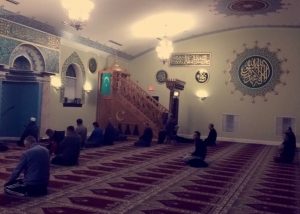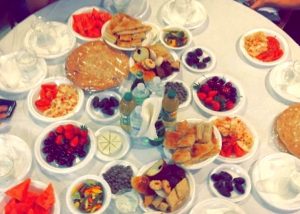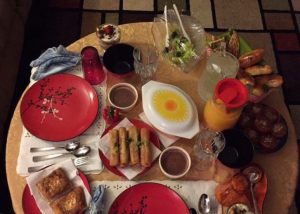Joe Milburn is a 22-year-old law student from St. Louis, Missouri who decided to approach the holy month of Ramadan a bit differently this year. For each night of this month, he is going to break his fast in a different mosque with different people. He hopes that this “mosque-hopping,” as he calls it, will help promote unity and inclusivity within his local community, among Muslims and non-Muslims alike.
“Why should America’s only exposure to Islam be from non-Muslims? I hope that by introducing people to real Muslims, Islamophobia would decrease, if at least one person at a time.”
Q: Salaam alaikum, Joe, may peace be with you. Firstly, I find the term “mosque-hopping” to be quite original. What inspired this idea, and how did you put it to action?

Wa Alaykum Salam! Well I know that in contemporary secular culture, many people who are into the club scene like to go club-hopping. I figured that if they can do that, why can’t I go mosque-hopping? Sadly, most mosques are strictly divided along ethnic lines and I figured that I (as well as the friends who sometimes accompanied me) can help provide exposure. The fact that I don’t “fit” into their molds of race and nationality is a reminder that there are Muslims of all backgrounds here in America. Allah (swt) states in the Quran, “we have made you into many nations and tribes.” (49:13). It is important for us as Muslims to recognize that.
Q: You have already invited your non-Muslims friends to accompany you for Iftar. What do you believe that can achieve?
Yes I haven taken a few non-Muslim friends so far. I plan to take a few more later on in the month. There are many misconceptions about Islam and Muslims and I feel that it is important to address them at least within my own circles. I’m not trying to convert anyone or anything like that, I just want to remove misconceptions. Due to the what mainstream media portrays and the way a minority of Muslims conduct themselves, I can’t blame the average non-Muslim for having a negative opinion of Islam or Muslims.
If I wanted to learn about any religion, like Judaism for example, I would spend time with Jews by attending Jewish events and gatherings. Learning about Judaism from non Jews isn’t effective. Why should America’s only exposure to Islam be from non-Muslims? I hope that by introducing people to real Muslims, Islamophobia would decrease, if at least one person at a time. The Prophet Muhammad (saws) was considered even by his enemies to be an honest man, so much so that they trusted him with their valuables despite being at war with him. For us as Muslims, it’s important to let non-Muslims judge us from our actions, not our words. The best way for that, I believe, is to expose them to our Muslim hospitality, especially during Ramadan.
Q: Tell us about your experiences. What was Iftar like the first few days of Ramadan? Where did you go?
 The first day of Ramadan, I went to a “Bosnian mosque” for Iftar. I don’t believe a mosque should belong to any specific ethnic group but the mosque is called Bosnian Islamic Center of Saint Louis. I took an Algerian friend with me and he was amazed by the similarities between Bosnian culture and Algerian culture. Saint Louis has the largest population of Bosnians in America. I myself have picked up a few Bosnian words from the locals. While I was at this mosque I was often mistaken for a Bosnian because of my race. A woman in her 40’s spoke Bosnian to me, and I had to explain to her that I didn’t understand what she was saying. She was so pleased that I memorized a few Bosnian phrases specifically for this visit, she snuck some food from the dinner for me to have for suhoor the next day.
The first day of Ramadan, I went to a “Bosnian mosque” for Iftar. I don’t believe a mosque should belong to any specific ethnic group but the mosque is called Bosnian Islamic Center of Saint Louis. I took an Algerian friend with me and he was amazed by the similarities between Bosnian culture and Algerian culture. Saint Louis has the largest population of Bosnians in America. I myself have picked up a few Bosnian words from the locals. While I was at this mosque I was often mistaken for a Bosnian because of my race. A woman in her 40’s spoke Bosnian to me, and I had to explain to her that I didn’t understand what she was saying. She was so pleased that I memorized a few Bosnian phrases specifically for this visit, she snuck some food from the dinner for me to have for suhoor the next day.
 The second day, I went to the Turkish center with two of my friends. I probably had one of the best meals I have ever had in my life. The food was unique and delicious. I can definitely see how Bosnian food was influenced by it. Almost everyone there was only speaking Turkish so I sort of just kept to myself. Their center is very beautiful though.
The second day, I went to the Turkish center with two of my friends. I probably had one of the best meals I have ever had in my life. The food was unique and delicious. I can definitely see how Bosnian food was influenced by it. Almost everyone there was only speaking Turkish so I sort of just kept to myself. Their center is very beautiful though.
After that I had a nice Algerian iftar at a friend’s house and I went to a few other iftars at a few other mosques. The most notable mosque was a West African one.
Q: What was unique about it?
Compared to Arab and Desi food, West African food is very healthy as well as delicious. There is less fried and fatty foods, and fruit is usually what is eaten for dessert. When I went that night with my Palestinian and Algerian friends, we definitely felt out of place. We were the only non Africans there but at the same time, it allowed us to step outside of our comfort zones and celebrate the African culture like everyone there.
Q: Were they welcoming of you?
Oh yes absolutely. In fact they even seemed surprised that “outsiders” came to visit. The mosque was located in an unfrequented side of town so they do not usually get visitors from other areas. It was a pleasant reminder that in Islam, racial, economic, age, and ethnic barriers don’t exist.
Q: What advice would you give to a non-Muslim who wants to take part in Iftar to experience Ramadan with the Muslims in their community? Can they just show up at a mosque and introduce themselves?
I would say in general that most mosques would be okay with that. With that said, many mosques do provide open house iftars where non-Muslims are openly invited. That way, they won’t feel so out of place. I suggest they should inquire about those, and bring a friend if they’re uncomfortable showing up alone.
Q: Now that you’ve seen how the mosques in your area are run, what do you wish to have seen differently?
I would have loved to see more support for converts. If they can provide opportunities for new converts to learn Islam instead of being on their own, that’d help so much. I also wish more mosques actively engage with other mosques in the area, to emphasize unity. It’s disheartening to see how isolated from, and sometimes against, each other they are.
I don’t see any problem with a mosque being primarily made up of a certain ethnicity or nationality, or if they give lectures in their language or have specific programs in their language. But my issue is when the name of a mosque has a specific ethnic group added to it, like I’ve seen a “Turkish mosque” “Palestinian mosque” “Bosnian mosque” etc. When the official name of a mosque has a specific group attached to it, it sort of gives off the wrong impression. It’s basically saying that anyone who is not one of us doesn’t belong. I’d love to see more mosques celebrating the cultures of their attendees without being exclusive to just the people of their specific culture.
Q: What is your favorite part of Ramadan?
My favorite part of Ramadan is the realization that at this time of year, Muslims all over the world are getting together to experience this month as a family. Families, neighbors, and friends often congregate to pray and break their fast together. There’s this whole atmosphere of unity and fellowship that I really love. It makes me realize that if Muslims can do this in Ramadan, it is possible for them to act like an inclusive community year-round.





